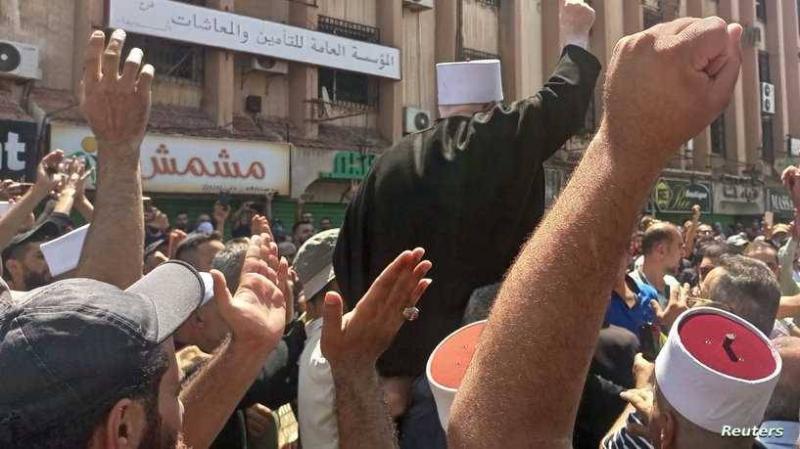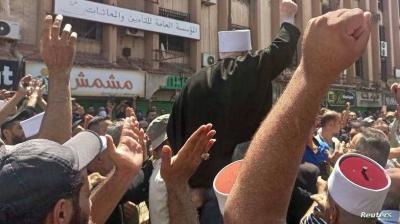The "remote clashes" that took place in the Sweida governorate on Monday night, in their true sense, involved local armed individuals against others affiliated with the Syrian army. This has raised serious concerns among residents and activists about the risk of "slipping into violence" and breaking the peaceful state that the Druze-majority area has maintained since August of last year. The clashes included gunfire and shelling directed at security branches and the "Baath Party" headquarters, sparked by the Syrian regime's decision to establish a security checkpoint at the northern entrance of Sweida, which angered residents, opposition activists, and local armed groups.
According to news networks, including "Sweida 24," the clashes resulted in injuries on both sides and caused material losses to civilian properties. A journalist from another news network, "Al-Rased," reported to Al-Hurra that the "clashes" calmed down on Monday morning, amidst discussions of a "temporary truce" and "negotiations."
The clashes primarily concentrated around the new checkpoint and adjacent security centers, including the "Air Intelligence" section and the Baath Party headquarters. They extended to the town of Qunayyat in the northern and eastern countryside, with the "State Security" branch along the way being hit multiple times by rocket shells.
It is unclear if the Syrian forces will retract their establishment of the security checkpoint at the entrance to the city or if they will need to withdraw and redeploy their forces to other positions in response to popular and local demands. The establishment of the checkpoint came unexpectedly, coinciding with ongoing peaceful protests against the Assad regime in "Martyrs' Square" in central Sweida, where demonstrators have been chanting for over 300 days for the overthrow of Bashar al-Assad and the implementation of UN Resolution 2254 concerning a solution in Syria.
Journalist Ma'rouf stated that "negotiations are currently ongoing," suggesting that they may either lead to an agreement to remove the checkpoint and withdraw the elements to their barracks, or the governorate could descend into an uncontrolled cycle of violence if security officials remain stubborn about not withdrawing the checkpoint.
Previously, Sweida had witnessed confrontations between armed military groups and the Syrian regime forces stationed at the security branches and checkpoints throughout the area. However, these encounters had generally not resulted in casualties or injuries and remained within the realm of "remote clashes," as noted by journalist Suleiman Fakhr, who works with "Al-Rased" news network. Consequently, Fakhr believes that "Monday night was distressing for civilians, not for the conflicting sides," remarking, "Gunfire and shells rained down... but from a distance."
A "Critical Event"?
Since the onset of popular protests against the Assad regime in Sweida, the regime has maintained a policy of non-commentary and negligence towards the opposition. This approach is interpreted in two ways: first, the regime is unable to use force and violence due to the city's religious sensitivity, and second, it relies on "the street’s fatigue to resolve itself."
Based on this, journalist Fakhr rules out an escalation from either side in the coming hours, stating, "The people of Sweida want the security checkpoint removed because it represents oppression and a restriction of freedoms, especially as they continue to demand the overthrow of the regime and the cessation of its security and party apparatus."
However, Syrian activist Lubna Al-Baset, who participates in the peaceful movement, views what happened on Monday night as "somewhat pivotal regarding what has been witnessed in the governorate for a long time." She clarified, "We have always emphasized our peacefulness... yet, we reject attempts by the Assad regime to intimidate Sweida."
According to Al-Baset, the regime seeks to "fragment the governorate and besiege it, pursuing anyone who stands against its repressive system" through the establishment of military checkpoints. She further asserted, "These checkpoints have never been for preserving security; rather, they serve to suppress the residents and economically extort them, while also allowing for the passage of drug shipments."
"Fears of Slipping into Violence"
Human rights activist Rima Fleihan emphasized that "it is crucial not to be drawn into violence, to exercise self-restraint, and to avoid an escalation toward armed conflict, as the consequences could be dire given the world's preoccupation with pressing issues in the region." Fleihan expressed concerns about the regime exploiting the recent events to increase military action and suppress the ongoing peaceful civil movement that has persisted for over 300 days.
She added that "slipping into violence is not in anyone's interest and will have disastrous consequences for the governorate." Activist Lubna Al-Baset does not consider what happened on Monday night as "turning to violence… but a form of threat." She stated that the clashes delivered a "message from the people of Sweida rejecting the military intimidation of Assad's forces in Sweida." In contrast, she believes that "violence is the language of the Syrian regime," which "tries to drag any peaceful protest into armed conflict as it has done in the past."
What to Expect?
The peaceful movement in Sweida, which began in August 2023, has taken various forms over the past months, including protesters defacing Baath Party offices and burning photos of Bashar al-Assad and his father, Hafez, along with images of what loyalists describe as "the state security" or "the Assad state." Before the clashes on Monday night, protesters had begun removing a statue of Bashar Assad's deceased brother, Basil Assad, at the northern entrance of Sweida.
Political activist Mashhoor Hamsho noted that what occurred cannot be separated from a series of events Sweida has witnessed in recent days, which included attempts to intimidate demonstrators in "Martyrs' Square" by throwing grenades before they gathered to chant against Assad, followed by incidents of kidnapping targeting the Druze cleric, Raed Al-Matni.
Hamsho linked the recent security actions taken by the Syrian regime in Sweida to the newly appointed governor, who has a poor reputation. He asserts that he "is attempting to apply a security solution" while "our youth insist on removing the security checkpoint at the entrance to Sweida and any other checkpoints." He added that "the local governance is robust, and the religious authority represented by Sheikh Houmoud Al-Hijri is excellent... We stand firm on the dignity of our people and our demands for liberation from the ruling authority... and the local population always holds the power."
"When the Syrian regime brings tanks and heavy weapons into the center of Sweida, we have no choice but to reject this violent criminal behavior," activist Lubna Al-Baset continued. She added, "The regime constantly tries to exploit events for its advantage. It claims that the checkpoints are for preserving the security of Sweida against ISIS, but everyone knows how it facilitated the entry of the terrorist organization into the governorate in 2018."
Source: Al-Hurra




